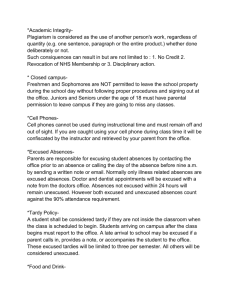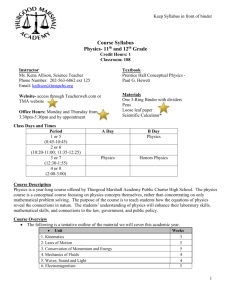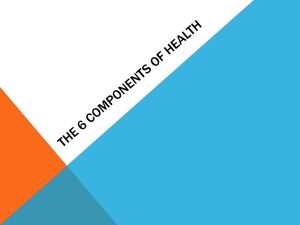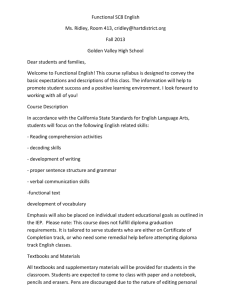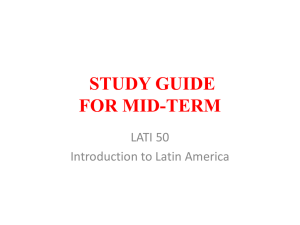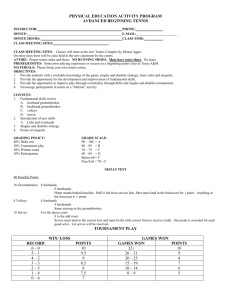COUN 7500 - Auburn University
advertisement
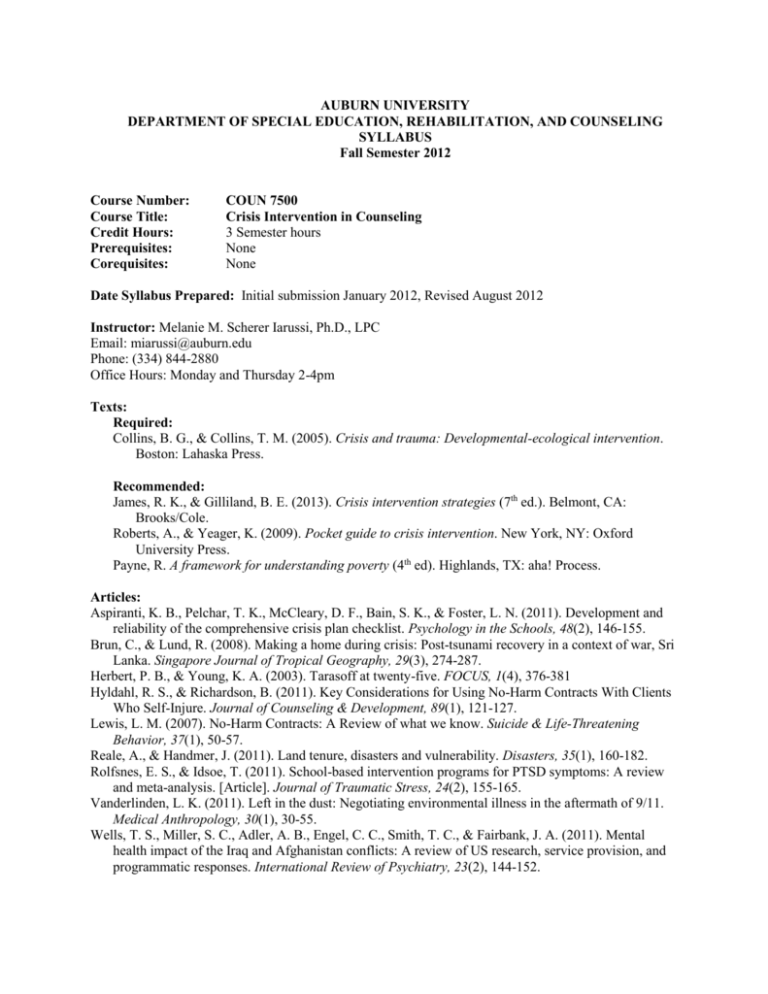
AUBURN UNIVERSITY DEPARTMENT OF SPECIAL EDUCATION, REHABILITATION, AND COUNSELING SYLLABUS Fall Semester 2012 Course Number: Course Title: Credit Hours: Prerequisites: Corequisites: COUN 7500 Crisis Intervention in Counseling 3 Semester hours None None Date Syllabus Prepared: Initial submission January 2012, Revised August 2012 Instructor: Melanie M. Scherer Iarussi, Ph.D., LPC Email: miarussi@auburn.edu Phone: (334) 844-2880 Office Hours: Monday and Thursday 2-4pm Texts: Required: Collins, B. G., & Collins, T. M. (2005). Crisis and trauma: Developmental-ecological intervention. Boston: Lahaska Press. Recommended: James, R. K., & Gilliland, B. E. (2013). Crisis intervention strategies (7th ed.). Belmont, CA: Brooks/Cole. Roberts, A., & Yeager, K. (2009). Pocket guide to crisis intervention. New York, NY: Oxford University Press. Payne, R. A framework for understanding poverty (4th ed). Highlands, TX: aha! Process. Articles: Aspiranti, K. B., Pelchar, T. K., McCleary, D. F., Bain, S. K., & Foster, L. N. (2011). Development and reliability of the comprehensive crisis plan checklist. Psychology in the Schools, 48(2), 146-155. Brun, C., & Lund, R. (2008). Making a home during crisis: Post-tsunami recovery in a context of war, Sri Lanka. Singapore Journal of Tropical Geography, 29(3), 274-287. Herbert, P. B., & Young, K. A. (2003). Tarasoff at twenty-five. FOCUS, 1(4), 376-381 Hyldahl, R. S., & Richardson, B. (2011). Key Considerations for Using No-Harm Contracts With Clients Who Self-Injure. Journal of Counseling & Development, 89(1), 121-127. Lewis, L. M. (2007). No-Harm Contracts: A Review of what we know. Suicide & Life-Threatening Behavior, 37(1), 50-57. Reale, A., & Handmer, J. (2011). Land tenure, disasters and vulnerability. Disasters, 35(1), 160-182. Rolfsnes, E. S., & Idsoe, T. (2011). School-based intervention programs for PTSD symptoms: A review and meta-analysis. [Article]. Journal of Traumatic Stress, 24(2), 155-165. Vanderlinden, L. K. (2011). Left in the dust: Negotiating environmental illness in the aftermath of 9/11. Medical Anthropology, 30(1), 30-55. Wells, T. S., Miller, S. C., Adler, A. B., Engel, C. C., Smith, T. C., & Fairbank, J. A. (2011). Mental health impact of the Iraq and Afghanistan conflicts: A review of US research, service provision, and programmatic responses. International Review of Psychiatry, 23(2), 144-152. COUN 7500 p. 2 Course Description: Development of skills and knowledge for crisis intervention and management in counseling, including prevention planning, intervention strategies and evaluation. Student Learning Outcomes: Upon completion of this course, students will be able to demonstrate these learning outcomes: 1. 2. 3. 4. 5. 6. 7. 8. 9. 10. 11. 12. 13. 14. 15. Awareness of counselors’ roles and responsibilities as members of an interdisciplinary emergency management response team during a local, regional, or national crisis, disaster or other traumacausing event. (II.G.1.c) Understand crisis intervention and suicide prevention models, including the use of psychological first aid strategies. (II.G.5.g) Understand the effects of crises, disasters, and other trauma-causing events on persons of all ages. (II.G.3.c) Awareness of human behavior, including an understanding of developmental crises, disability, psychopathology, and situational and environmental factors that affect both normal and abnormal behavior. (II.G.3.f) Understand the impact of crises, disasters, and other trauma-causing events on people. (CMHC.A.9) Understand the principles of crisis intervention for people during crises, disasters, and other traumacausing events. (CMHC.C.6) Understand appropriate use of diagnosis during a crisis, disaster, or other trauma causing event. (CMHC.K.5) Differentiate between diagnosis and developmentally appropriate reactions during crises, disasters, and other trauma-causing events. (CMHC.L.3) Demonstrate the ability to use procedures for assessing and managing suicide risk. (CMHC.D.6) Demonstrate the ability to modify counseling systems, theories, techniques, and interventions to make them culturally appropriate for diverse populations. (CMHC.F.3.) Screen for addiction, aggression, and danger to self and/or others, as well as co-occurring mental disorders. (CMHC.H.3.) Understand the potential impact of crises, emergencies, and disasters on students, educators, and schools, and knows the skills needed for crisis intervention. (SC.C.6) Awareness of the impact of advocacy and diversity in the process of crisis management and intervention. Understand the impact of human behavior, including war, on the environment and the subsequent crisis situations that arise for people experiencing these situations and environments. Awareness of how a sustainable lifestyle can impact the environment, interpersonal relationships, and crisis response. Assignments/Projects: 1. Midterm/Final: A midterm and final will be used in this course to assess students’ knowledge, awareness, and ability to apply course content. 2. Wellness Plan: Reflect on and assess your current self-care. Consider physical, mental, emotion, spiritual, and relational components. Identify your strengths and need for improvement and develop a wellness plan. a. Document the wellness plan and follow it this semester. Due 9/4/12 b. At the end of the semester, reflect once again on your current self-care. How well did you follow your wellness plan? What roadblocks did you encounter? How did you overcome them or what might help you overcome them in the future? What did you find helpful about creating and maintaining a wellness plan? Due 11/13/12 COUN 7500 p. 3 3. Surviving Client Suicide: Read and reflect on at least two entries submitted to the “Clinicians as survivors of suicide: Personal accounts by clinician survivors” at http://mypage.iu.edu/~jmcintos/personacc.htm. Write about your reactions, personally and professionally, to these accounts. Due 9/18/12 4. Crisis memoir analysis: Read a book about someone’s experience of crisis. You may select from the provided reading list or make another selection with the instructor’s approval. After reading the book, complete an analysis of the book outlining the components of crisis discussed in the class that are applicable, including the developmental and ecological considerations. Describe the services the protagonist received to help him or her through the crisis and evaluate the effectiveness of the services. Describe how you might have treated this person if you were to have encountered them in the midst of his or her crisis. Follow the grading rubric provided. (minimum of 5 pages) Due 10/30/12 5. Recent crisis group project: Research a specific recent crisis that has been discussed in the news (wildfires, sexual abuse cases, suicide, military issues, tornadoes, etc.). In a 30-45 minute presentation, apply knowledge learned in class and at least 10 additional sources (reference page must be provided) to describe each of the following areas (Due 11/6/12 or 11/13/12): a. The crisis or critical incident b. The anticipated experiences and needs of the survivors c. Legal or ethical issues involved in the case d. Environmental and developmental influences e. Appropriate assessments of the survivors f. How mental health professionals might be helpful g. Possible helpful referrals Grading and Evaluation: Please note: Course assignments are due on the dates specified. When assignments are turned in late, without an excused or approved absence, scores for the assignment(s) will be reduced by 5% per day, with no assignments accepted more than 1 week past the due date. Please refer to the Class Policy Statements in the course syllabus for information about excused absences and making up assignments. Students in this course are required to complete the specified course requirements. Student’s final evaluation is based on these components: Midterm Final Wellness Plan Part A Wellness Plan Part B Surviving Client Suicide Crisis Memoir Analysis Recent Crisis Group Project TOTAL The following scale will be used: 225-250 200-224 175-199 150-174 149 and Below =A =B =C =D =F 50 50 10 10 10 50 70 250 COUN 7500 p. 4 Class Policy Statements: 1. Attendance: Students may miss up to one class without penalty. Additional absences will result in grade reduction, and students will be held responsible for any content covered in the event of an absence. Students are expected to be on time for class. 2. Excused absences: Students are granted excused absences from class for the following reasons: illness of the student or serious illness of a member of the student’s immediate family, trips for student organizations sponsored by an academic unit, trips for university classes, trips for participation in intercollegiate athletic events, subpoena for a court appearance, and religious holidays. Students who wish to have excused absences from class for any other reason must contact the instructor in advance of the absence to request permission. The instructor will weigh the merits of the request and render a decision. When feasible, the student must notify the instructor prior to the occurrence of any excused absences, but in no case shall notification occur more than one week after the absence. Appropriate documentation for all excused absences is required. Please see University Policies https://sites.auburn.edu/admin/universitypolicies/default.aspx for more information on excused absences. 3. Make-Up Policy: Arrangement to make up a missed major examination (e.g., hour exams, mid-term exams) due to properly authorized excused absences must be initiated by the student within one week of the end of the period of the excused absence(s). Except in extraordinary circumstance, no make-up exams will be arranged during the last three days before the final exam period begins. 4. Academic Honesty Policy: All portions of the Auburn University student academic honesty code (Title XII) found in the University Policies https://sites.auburn.edu/admin/universitypolicies/Policies/Forms/Academic.aspx will apply to university courses. All academic honesty violations or alleged violations of the SGA Code of Laws will be reported to the Office of the Provost, which will then refer the case to the Academic Honesty Committee. 5. Disability Accommodations: Students who need accommodations are asked to arrange a meeting during office hours the first week of classes, or as soon as possible if accommodations are needed immediately. If you have a conflict with my office hours, an alternate time can be arranged. To set up this meeting, please contact me by e-mail. If you have not established accommodations through the PSD office, but need accommodations, make an appointment with The Office of Accessibility, 1228 Haley Center, 844-2096 (V/TT). 6. Course contingency: If normal class and/or lab activities are disrupted due to illness, emergency, or crisis situation, the syllabus and other course plans and assignments may be modified to allow completion of the course. If this occurs, an addendum to your syllabus and/or course assignments will replace the original materials. 7. Professionalism: As faculty, staff, and students interact in professional settings, they are expected to demonstrate professional behaviors as defined in the College’s conceptual framework. These professional commitments or dispositions are listed below: a. Engage in responsible and ethical professional practices b. Contribute to collaborative learning communities c. Demonstrate a commitment to diversity d. Model and nurture intellectual vitality 8. Use of Electronics: Cell phones must be put on silent and stored during class times, unless the instructor is notified of special circumstances (e.g., on-call professional services, family emergencies). Computers and electronic notepads are welcomed, but may be used for class purposes only and must not be a distraction. COUN 7500 p. 5 Course Schedule Week 1 Date 8/21/12 2 8/28/12 3 9/4/12 4 9/11/12 5 9/18/12 6 9/25/12 Crises of war and the environment: Issues of sustainability Substance abuse 7 8 10/2/12 10/9/12 MIDTERM EXAM Sexual Assault Intimate Partner Violence Ch. 6 & 7 9 10/16/12 Terminal illness & Death Ch. 9 & 10 10 10/23/12 Abused Children School-based crises Ch. 11 & 12 Rolfnses & Idsoe (2011) Neigh, Ritschel, & Nemeroff (2010)* 11 10/30/12 Disaster Trauma Emergency Preparedness Ch. 13 Aspiranti et al. (2011) Crisis Memoir Analysis Due 12 11/6/12 Group Presentations 13 11/13/12 Group Presentations 14 11/20/12 15 11/27/12 THANKSGIVING – NO CLASS FINAL EXAM *Notes optional reading Content Welcome and Orientation Introduction to Crisis Intervention Understanding Crisis and Crisis Intervention Preventing Counselor Burnout Assessment and Crisis Intervention through a Developmental-Ecological Approach Psychological First Aid Crisis Intervention Competence Legal and Ethical issues related to confidentiality Diagnosis and Lethality Intervention with Suicidal and Homicidal Clients Ethical and Legal Issues Readings/Assignments Due Ch. 1 & 14 Ch. 2 & 3 Wellness Plan Part A Due Psychological First Aid: Field Operations Guide Ch. 4 Herbert & Young (2002) Ch. 5 TIME Article: A Memoir of Schizophrenia Hyldahl & Richardson (2011) Lewis (2007)* Surviving Client Suicide Reflection Due Wells et al. (2011) Reale & Handmer (2011) Vanderlinden (2011) Brun & Lund (2008)* Chapter 8 Wellness Plan Part B Due COUN 7500 p. 6 Justification for Graduate Credit: This course includes advanced content crisis intervention. This includes content as specified by the Council for the Accreditation of Counseling and Related Programs (CACREP, 2009). All academic content approved by CACREP is for advanced Masters and/or Doctoral graduate study. This includes rigorous evaluation standards of students completing the student learning outcomes specified in this syllabus. SYLLABUS DISCLAIMER: The instructor reserves the right to make changes to the syllabus as needed due to the developmental needs of the students. In the event that changes are deemed necessary, the instructor will inform students at the earliest date possible in class or via email.
